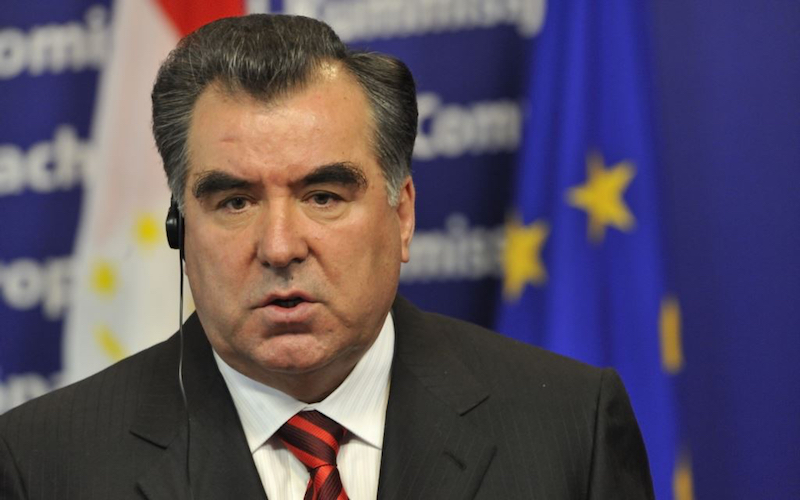
Will Human Rights Ever Matter in Central Asia?
Kerry’s recent visit to Central Asia – the first by a U.S. Secretary of State since James Baker in 1992 – was naturally hailed as a breakthrough for Central Asian-U.S. relations. As one of the first countries to recognize the independence of these states following the fall of the U.S.S.R., the U.S. retains a historical connection to post-Cold War Central Asia. The context for Kerry’s visit was the rollout of a new format for cooperation with Central Asian states, labeled most unimaginatively as the “C5+1.” Kerry met with foreign ministers from each country in preparation for the release of a joint communication detailing aspects of this cooperation, with particular emphasis on economic ties.
Overshadowed by the joint celebration was the poor human rights record of the five Central Asian countries. While some have adopted anti-torture laws, cases of torture are rarely investigated. Of the five, Turkmenistan may currently be the worst; the government seizes private satellite dishes, and recently reversed a ban on opera, but maintains a ban on ballet. Americans with a distaste for ballet might laugh, but it is worth noting that Freedom House, an independent monitoring organization in the U.S., ranks Kazakhstan, Tajikistan, Turkmenistan, and Uzbekistan as “Not Free” – the lowest possible ranking – and Kyrgyzstan as “Partly Free.” In a meeting with Islam Karimov, president of Uzbekistan who has been in power for 25 years, an American reporter was escorted from the room after shouting out a question about human rights. The U.S. Department of State’s own report on global human rights reports torture and forced labor in Uzbek cotton fields – but Uzbekistan has provided logistical support for ISAF operations in Afghanistan and is thought to be a reliable partner in the effort against Islamic extremism.
As might be expected, Kerry’s referencing of human and political rights issues was relatively vague and disconnected, limited to an allusion to “the human dimension” as a topic that he might possibly raise during a private meeting with Uzbekistan President Islam Karimov.
He later mentioned the importance of good governance and “health of the civil society; by the ability of every individual to enjoy basic freedoms of thought, speech, and religion, and to engage in political expression of political views” without specifically referencing any country.
Background
Central Asia has received renewed international attention. Besides overtures from Russia and China, the Indian PM visited in July 2015, and Ban Ki Moon in June 2015. There is an emerging international consensus that Central Asia’s “backwater” status may be coming to an end. However, it is increasingly clear that the bulk of international engagement will focus on several core issues – but with a light footprint on human rights.
While a number of substantive issues inform the character of U.S. engagement with the C5, these issues are overshadowed by attention to the expansion of Russian and Chinese influence in the region. Owing to not only simple geography, but also to the fact that Russia and China are part of the Shanghai Cooperation Organization (SCO), they are naturally closer to the Central Asian countries, and maintaining a counter against the expanded interest of other states in this region – particularly China, given the U.S.’s “Pivot to East Asia,” will remain strategically important for the United States. Within that context, U.S. interest in the C5 might be described through the lenses of several different areas: regional security, counterterrorism (CT) and countering violent extremism (CTE); economic cooperation, particularly oil and gas exports; and human rights. All indications on this trip pointed to a soft-pedaling of human rights issues in favor of solidifying or expanding cooperation on security and economic issues.
The EU has initiated what it terms “human rights dialogues” with each country structured to provide feedback on legal and judicial reforms and provide a mechanism for the EU to present its human rights -concerns However, while the EU is undoubtedly important to Central Asia, it might be less of a critical partner than China, Russia, or the US. Nor has Central Asia been important to the EU. Until the Paris attacks, counterterrorism was not on the forefront of the European consciousness, and access to Central Asian energy resources is important but not as critical for European growth and stability. Perhaps this mutual de-emphasis on strategic importance explains why the EU is able to prioritize a human rights dialogue, as it has less to lose from any backlash resulting from outright criticism.
Regional Security, CT and CVE
U.S. withdrawal from Afghanistan has obvious repercussions for regional security, particularly for Tajikistan, Turkmenistan, and Uzbekistan, which border Afghanistan. Fluctuations in the pace of this withdrawal actually influence regional stability. Central Asian nations may have a perception that as U.S. involvement withers, they may shift to a greater reliance on security assurances from Russia; likewise, Russia could use real or imagined infiltration by Islamic militants to increase its military presence there, especially if those states do not perceive that the U.S. will be a helpful ally.
Kazakhstan is also competing with Thailand for a non-permanent seat on the U.N. Security Council for 2017-18, to be voted in October 2016.
Internationally known “brand-name” terrorist groups operate in the area, such as the Islamic Movement of Uzbekistan (IMU). It is thought that the American withdrawal from Afghanistan will lead to an increase of terrorist activity in Waziristan, and that the IMU may relocate some of its activities there, or that IS or Al Qaeda militants might encroach upon Central Asian territory as well. The UN Global Counter-Terrorism Task Force in Central Asia, particularly with its Joint Plan of Action of Asian States, has been working to craft a shared strategy for counterterrorism in Central Asia to be implemented in concert by its member states. So far, implementation of this strategy has been slow and operationally unsuccessful. The Organization for Security & Cooperation in Europe is training Turkmenistani and Tajikistani officers to counter terrorist threats from Afghanistan, and the U.S. is supporting this effort.
All five of the Central Asian nations are Islamic-majority states, and a major fear is that radicalization of parts of their Islamic populations will boost the number of foreign fighters joining ISIS in the Middle East. Kazakhstan’s intelligence agency, the KNB, recently reported that 300 Kazakhs had joined the Islamic State, including 50 women. However, Kerry also urged rulers of these states not to overreact by cracking down on political Islam. The government of Tajikistan recently banned its Islamic Renaissance Party, and arrested 78 of their members and enforced penalties for the wearing of long beards.
Energy & Gas
Central Asia is oil and gas rich, and is thought by some analysts to be on track to surpass the Gulf as an energy producer, particularly as vast amounts of gas are thought to remain still undiscovered in Uzbekistan. Because Central Asian producers can export by land to Europe, a cheaper option than by sea, they are a more logical option for European buyers. However, depressed prices for oil and gas have caused budget shortfalls in these countries. The collapse of the Russian ruble has also decreased remittances and depressed a market they rely on to purchase their natural resources. They are therefore eager to accept overtures particularly from China, which is increasing gas purchases from Kazakhstan and Turkmenistan.
Human Rights
All indications from this trip suggest that Kerry soft-pedaled human rights issues in order to emphasize cooperation around regional security, counterterrorism and energy, and to encourage warmer ties in order to push back against the expanding regional influence of Russia and China. Kerry made general suggestions that progress on human rights might enhance U.S. cooperation in other areas but offered no specific assurances or details of the consequences should the human rights situation fail to improve. The foreign minister of Kyrgyzstan complained to Kerry that the U.S. had given a human rights award to a jailed Kyrgyz activist; Kerry insisted that this minor point should not disrupt Kyrgyz-U.S. cooperation against the Islamic State. It seems certain that as long as U.S. policymakers are focused on counterterrorism in Afghanistan and Pakistan, international gas rights, and countering Russian and Chinese influence in the developing world for the foreseeable future, human rights issues will continue to be set aside.

